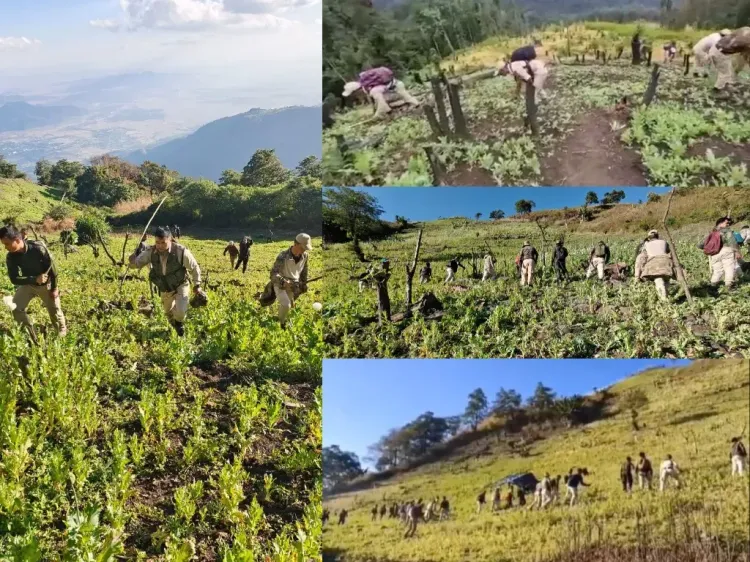Over 19,135 Acres of Poppy Cultivation Eradicated in Seven Years: Report from Manipur Government

Imphal, Dec 2 (NationPress) Various law enforcement agencies, including Manipur Police, have successfully eradicated 19,135.60 acres of illegal poppy cultivation within the state’s 12 districts from 2017 to 2024, according to an official report published on Monday.
The report, compiled by the Manipur Remote Sensing Applications Centre (MARSAC), indicated that the mountainous Kangpokpi district saw the largest destruction, with 4,454.4 acres of poppy fields eliminated over the last seven years (2017-2024). This was followed by 3,348 acres in Ukhrul and 2,713.8 acres in Churachandpur. MARSAC operates as an autonomous entity within the Planning Department of the Government of Manipur.
Other districts where illegal poppy farming was dismantled during this timeframe include 2,575 acres in Tengnoupal, 1,982.5 acres in Chandel, 1,682 acres in Senapati, and 737.9 acres in Imphal East.
Out of the state’s 16 districts, the 12 affected areas are predominantly located in mountainous regions.
As per the report, the most significant destruction of illegal poppy cultivation occurred in 2020-21 with 4,652 acres and in 2022-23 with 4,305.10 acres destroyed.
The report, accessed by IANS, noted that the area designated for illegal poppy farming in nine districts—namely Chandel, Churachandpur, Kamjong, Kangpokpi, Noney, Senapati, Tamenglong, Tengnoupal, and Ukhrul—was 28,598.91 acres in 2021-22, which significantly reduced to 11,288.1 acres in 2023-24.
In total, there was a 32.13 percent reduction in opium poppy cultivation in the state in 2023-2024 compared to the prior year, with over 11,288.07 acres of poppy cultivation recorded in 2023-2024.
A decline of 60 percent in the acreage under illegal poppy cultivation was observed between 2021 and 2023.
The report highlighted that following the initial meeting of the Anti-Narcotic Task Force on March 29, 2022, MARSAC has been conducting annual monitoring of opium poppy cultivation in various districts of Manipur using Global Positioning System (GPS) and Remote Sensing technologies.
Environmental degradation from extensive poppy farming has led to numerous negative effects on the ecosystem, including soil erosion, biodiversity loss, and shifts in local climate, as stated in the report.
Another report from the Manipur government revealed that since 2017, the state launched the ‘War on Drugs’, seizing or destroying narcotics valued at Rs 60,000 crore in the international market.
The confiscated drugs include 304 kg of heroin powder, 3,775 kg of brown sugar, 1,804 kg of opium, 1,976 kg of Yaba tablets, and 422 kg of SP tablets, ice crystal, and pseudoephedrine.
Recently, the Manipur government stated that the ongoing ethnic conflict in the state, persisting since May last year, has been fueled by illegal immigrants from Myanmar, who began illicit poppy cultivation after settling unlawfully in the region.
Chief Minister N. Biren Singh’s ‘War on Drugs’ initiative has significantly impacted the illegal activities of these migrants, according to a government statement.
The statement further noted that since 1969, the number of villages in the districts of Kangpokpi, Tengnoupal, Chandel, Churachandpur, and Pherzawl increased by 893, growing from 731 to 1,624.
In contrast, the remaining hill districts dominated by the Naga community, including Tamenglong, Noney, Senapati, Ukhrul, and Kamjong, showed a mere increase of 49 villages, from 527 to 576, indicating only a 9 percent rise.
The government statement remarked on the unusual 122 percent surge in village proliferation, particularly in forested areas of the five hill districts, where the Kuki community is predominantly present.
(Sujit Chakraborty can be reached at sujitchakrabortyne@gmail.com)








